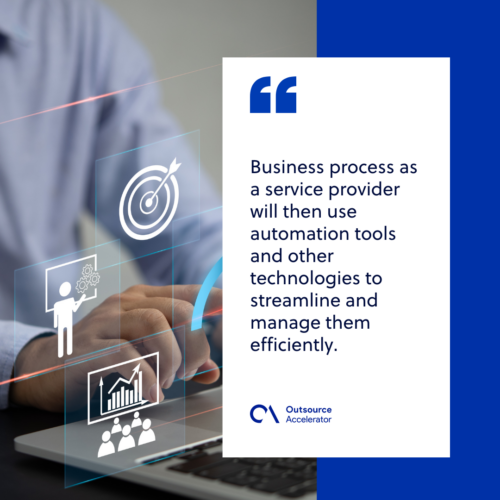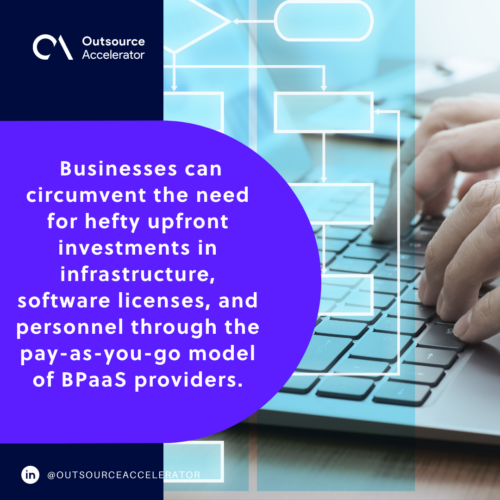The transformative impact of business process as a service on enterprises

Business process as a service (BPaaS) has revolutionized how enterprises operate. It enabled firms to optimize their processes, enhance efficiency, and drive growth.
Companies are always on the lookout for innovations that could keep them ahead of the curve, and business process as a service is just the answer.
Through cloud-based solutions and technological innovations, business process as a service offers a flexible, scalable, and cost-effective approach to managing various functions.
Read on below to learn how BPaaS can help optimize your organization.
What is business process as a service?
Business process as a service is a transformative approach that lets companies outsource their non-core functions to third-party service providers.
Using cloud-based technologies, automation tools, and service-level agreements enables BPaaS to become a cost-effective and scalable business solution.
Enterprises can offload time-consuming and resource-intensive processes to specialized service providers through business process as a service.
For example, a software vendor firm can entrust its human resources (HR) to a business process outsourcing (BPO) company specializing in HR services. Doing so allows the firm to focus on its core processes, drive innovation, and use its resources more efficiently.

Key components of business process as a service
Business process as a service is comprised of various components working together to provide seamless, efficient, and scalable business solutions.
These elements include:
Cloud-based infrastructure
BPaaS relies on cloud computing infrastructure to host and deliver the services. Cloud platforms provide the scalability, reliability, and security required to handle business processes efficiently.
Process automation tools
BPaaS involves the automation of business processes to improve efficiency and reduce manual effort. This reduces human intervention and makes the functions faster, more efficient, and less prone to error.
Service level agreements
As discussed earlier, BPaaS operates based on SLAs that define the quality, availability, and performance metrics of their services. SLAs outline the responsibilities of the business process as a service provider and their clients, ensuring transparency and accountability.
How does business process as a service work?
Take a closer look below at how exactly business process as a service works.
Identifying process requirements
Knowing which processes can be outsourced is the first step in implementing business process as a service.
Typically, these processes include:
- Human resources
- Finance and accounting
- Customer support
Selecting a BPaaS partner
Once you’ve identified which processes to outsource, you can proceed to finding a reliable business process as a service provider.
When selecting a potential BPaaS partner, you’ll want to have a provider specializing in providing scalable and efficient solutions that fit your organization’s unique needs.
Defining service level agreements (SLAs)
Establishing service level agreements is crucial to ensure both parties have a clear understanding of expectations and performance metrics.
SLAs usually cover the scope of services, response times, quality standards, and other key performance indicators.
Migration and integration
After establishing SLAs, the next step is migrating the processes to be outsourced to the business process as a service’s provider’s cloud-based infrastructure.
This part may involve integrating existing systems, data migration, and setting up secure connections for seamless communication.
Process automation and management
Your business process as a service provider will then use automation tools and other technologies to streamline and manage them efficiently.
Using automation decreases manual intervention, improves accuracy, and accelerates process execution.
Real-time monitoring and reporting
Reliable business process as a service providers offer clients real-time monitoring capabilities. Being able to oversee the outsourced processes in real-time gives businesses insights into their performance, identify bottlenecks, and make data-driven decisions.

Business process as a service vs. Traditional outsourcing
Although both business process as a service and traditional outsourcing involves handing over processes to external parties, the two have key differences.
Scope of outsourcing: Business process as a service vs. Traditional outsourcing
Business process as a service
- Businesses typically outsource specific business processes or functions to specialized service providers.
- Outsourced processes often include non-core functions (e.g., HR, finance, or customer support).
- BPaaS providers offer cloud-based solutions and process automation tools to streamline and manage these processes
Traditional outsourcing
- Businesses may outsource entire departments or functions to external service providers.
- Outsourced functions can include IT infrastructure management, call centers, or manufacturing.
- The outsourcing partner assumes responsibility for executing and managing the outsourced functions.
Level of customization and flexibility: Business process as a service vs. Traditional outsourcing
Business process as a service
- BPaaS providers often offer standardized, pre-configured solutions that can be tailored to some extent to meet the specific needs of different businesses.
- The level of customization may be limited to maintain scalability and cost-effectiveness.
Traditional outsourcing
- Traditional outsourcing arrangements generally provide a higher degree of customization.
- Businesses can negotiate and define specific requirements, processes, and service levels with the outsourcing partner.
Technology and infrastructure
Business process as a service
- BPaaS relies heavily on cloud-based infrastructure and advanced automation tools.
- BPaaS providers leverage technology to deliver process efficiency, scalability, and real-time monitoring.
- Infrastructure is shared among multiple clients, promoting cost savings and seamless upgrades.
Traditional outsourcing
- Traditional outsourcing may or may not involve cloud-based infrastructure.
- It can encompass various technology setups, depending on the nature of the outsourced function and the agreement between the business and the outsourcing partner.
Cost structure
Business process as a service
- BPaaS often follows a pay-as-you-go or subscription-based pricing model. Clients pay for their specific services and resources, allowing for cost optimization and scalability.
- Costs are typically more transparent, with fewer upfront investments.
Traditional outsourcing
- Traditional outsourcing can involve different pricing structures, such as fixed monthly fees or project-based billing.
- Clients may need to make significant upfront investments, particularly for infrastructure setup or dedicated resources.
Responsibility and control
Business process as a service
- The BPaaS provider assumes responsibility for executing, managing, and improving the outsourced processes.
- Providers maintain control over the underlying technology infrastructure and ensure compliance with SLAs.
Traditional outsourcing
- Clients often retain a higher level of control over the outsourced functions.
- Clients may have direct involvement in process management, quality control, and decision-making.
Advantages of adopting business process as a service
Implementing business process as a service brings various benefits to companies.
These include:
Scalability and flexibility
Business process as a service providers can easily scale up or down to accommodate fluctuations in their clients’ businesses.
This level of adaptability and flexibility allows companies to adapt to dynamic market conditions without significant infrastructure investments.
Security and compliance
Firms partnering with business process as a service providers can rest assured that BPaaS providers prioritize data security and compliance with industry regulations.
BPaaS companies implement robust security measures (e.g., encryption, access control, and regular audits) to safeguard sensitive business information.
Cost savings
Its cost-effectiveness is another one of business process as a service’s advantages. Businesses can circumvent the need for hefty upfront investments in infrastructure, software licenses, and personnel through the pay-as-you-go model of BPaaS providers.
The scalability and flexibility of business process as a service model mentioned earlier also help companies utilize resources more efficiently.

Types of business processes covered by BPaaS
Business process as a service covers a wide range of functions across various industries.
Below are some of the sectors covered by business process as a service providers.
Human resources processes
Leveraging business process as a service solutions can help companies improve efficiency and enhance employee engagement.
Key aspects of HR processes that benefit from implementing BPaaS include:
- Recruitment and onboarding
- Employee data management
- Payroll processing
- Performance management
- Training and development
Finance and accounting processes
Companies implementing BPaaS solutions for finance and accounting functions can streamline workflows, improve data accuracy, and reduce manual errors.
This lets them focus on financial analysis, strategic planning, and providing insights to support business growth.
Processes enhanced by BPaaS implementation include:
- Accounts payable and receivable
- General ledger management
- Financial reporting and analysis
- Expense management
- Tax preparation and compliance
Customer relationship management (CRM) processes
Using business process as a service solutions can significantly boost the effectiveness of a company’s CRM processes.
Key aspects of CRM functions that benefit from BPaaS implementation include:
- Lead generation and qualification
- Sales pipeline management
- Customer data management
- Order processing and fulfillment
- Customer support and helpdesk services
Supply Chain and Logistics Processes
Entrusting supply chain and logistics processes to BPaaS firms can help businesses reduce costs and improve customer satisfaction.
The essential aspects of these functions that benefit from business process as a service include:
- Inventory management
- Procurement and vendor management
- Order tracking and fulfillment
- Warehouse management
- Distribution and logistics coordination
IT and Technical Support Processes
Like the previous processes listed above, companies also benefit from handing over IT and technical support functions to BPaaS providers. BPaaS solutions enable businesses to provide reliable and efficient IT support.
Key aspects of IT and technical support processes that benefit from implementing business process as a service solutions include:
- Helpdesk and technical support services
- Infrastructure management
- Software installation and updates
- Network monitoring and security
- Data backup and recovery







 Independent
Independent




